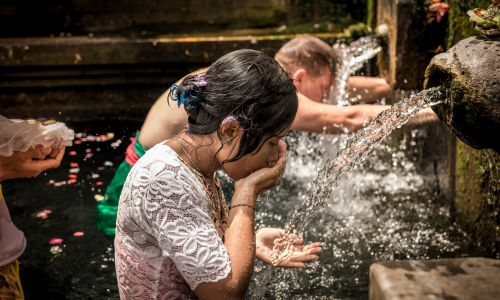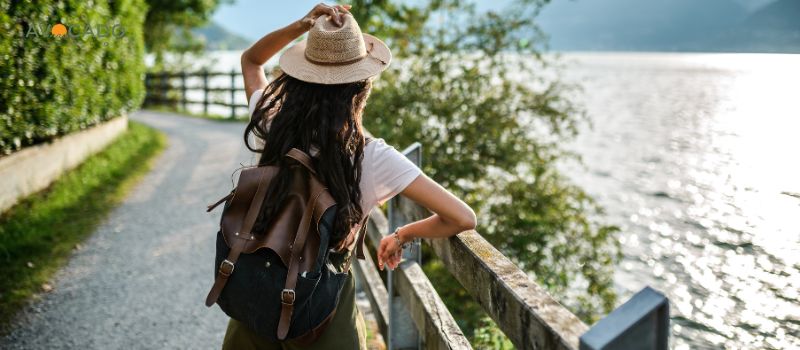Bali’s west coast is often overshadowed by the bustle of Ubud and the beaches of Canggu, yet Medewi nestled in Jembrana offers something truly unique: a destination where surf culture, slow living, and eco-conscious values meet.
Famous for its long left-hand waves and laid-back village atmosphere, Medewi is increasingly attracting travelers seeking not just adventure, but also sustainable ways to explore Bali.
In today’s world, where overtourism and environmental challenges put pressure on destinations, sustainable travel is no longer optional it’s essential.
By making mindful choices, visitors to Medewi can enjoy its natural beauty, support the local community, and leave a positive impact for generations to come.
This guide highlights practical, educational, and inspiring tips for eco-friendly travel in Medewi, so you can immerse in its charm while aligning your journey with sustainability.
1. Choose Eco-Conscious Stays

Accommodation is often the biggest footprint travelers leave behind. In Medewi, a growing number of guesthouses, surf camps, and eco-lodges are adopting sustainable practices.
From solar-powered water heaters to bamboo-built villas, many local stays are designed to minimize environmental impact while offering comfort and authenticity.
When booking, look for accommodations that:
- Use renewable energy or solar panels.
- Reduce single-use plastics by providing refillable water stations.
- Source food locally, supporting Jembrana farmers.
- Encourage cultural immersion, like Balinese cooking or surf lessons with locals.
Note: Supporting eco-friendly lodges strengthens the local economy, reduces carbon emissions, and helps preserve Medewi’s coastal ecosystem.
2. Support Local Farmers and Warungs
Medewi’s charm lies in its simple, village-based lifestyle. Instead of relying on imported foods or chain restaurants, opt for meals at local warungs (small eateries).
These spots not only serve delicious Balinese dishes—like nasi campur, tempeh goreng, and fresh grilled fish but also connect you directly to the community.
Farmers in Jembrana supply seasonal fruits like papayas, bananas, and mangoes, which are nutrient-dense and eco-friendly compared to imported produce. Choosing local dishes reduces food miles and sustains traditional foodways.
Tip: Visit the morning market in Negara or the smaller stalls near Medewi Beach to shop seasonal, organic produce. Not only is it healthier, but it also supports Bali’s philosophy of Tri Hita Karana harmony with nature, people, and the divine.
3. Reduce Plastic and Go Zero-Waste
Like many coastal destinations, Bali struggles with plastic waste, especially in rainy season when debris flows into the sea. Travelers can make a difference by embracing zero-waste habits.
Practical steps include:
- Carrying a reusable water bottle and refilling at eco-cafes or hotels.
- Bringing a cloth bag for market shopping.
- Using bamboo or steel straws (many Medewi cafes already provide them).
- Packing snacks in reusable containers instead of buying plastic-wrapped goods.
Note: Every single-use plastic avoided in Medewi helps protect marine life and keeps its beaches pristine for surfers and locals alike.
4. Explore Nature Mindfully

Medewi is not just about surfing it is surrounded by rice fields, coconut groves, and traditional villages waiting to be explored. Sustainable exploration means enjoying these landscapes without disturbing them.
Ways to explore responsibly:
- Trek through rice terraces with a local guide who can explain traditional irrigation (subak).
- Join cycling tours through villages to minimize motorbike emissions.
- Respect wildlife avoid touching or feeding animals, and always stick to marked trails.
If snorkeling near nearby reefs, use reef-safe sunscreen to protect coral ecosystems.
Tip: Choose experiences that involve education, such as eco-tours explaining Bali’s water temple networks or organic farming workshops in Jembrana.
5. Embrace Slow Travel and Surf Ethically
Medewi’s surf break is legendary it is Bali’s longest left-hand wave, drawing surfers from around the world. Yet, sustainability also applies to the way you surf and travel.
Instead of rushing through, slow down. Spend a week or more learning about the rhythm of local tides, practicing patience in the lineup, and respecting surf etiquette.
Eco-surf practices include:
- Using eco-friendly surf wax and boards.
- Avoiding surf tourism companies that exploit locals without giving back.
- Supporting community-led surf schools, often run by young Medewi surfers who reinvest earnings into their families and beach cleanups.
By staying longer and contributing to the surf culture respectfully, travelers minimize carbon impact while creating meaningful connections.
6. Participate in Community and Conservation Projects
One of the most rewarding aspects of visiting Medewi is the opportunity to give back. Several local initiatives focus on beach cleanups, mangrove restoration, and turtle conservation along the Jembrana coastline.
Joining these projects not only deepens your travel experience but also leaves a tangible positive footprint.
Examples of activities:
- Weekly beach cleanups organized by local surf clubs.
- Tree-planting programs in nearby villages.
- Workshops teaching sustainable crafts, like coconut shell carving.
Educational Note: Participation in such projects helps address the very issues tourism creates, bridging the gap between enjoyment and responsibility.
7. Respect Balinese Culture and Spiritual Practices

Sustainability in Bali is not just about the environment it is equally about cultural preservation. Medewi, like all of Bali, thrives on daily rituals, temple ceremonies, and community gatherings.
As a traveler, you can honor this by:
- Dressing modestly when attending ceremonies.
- Asking permission before taking photos at temples.
- Supporting local artisans who keep traditional crafts alive.
Remember, cultural respect ensures that tourism does not erode traditions but rather strengthens them through appreciation and fair support.
Why Medewi Is a Model for Sustainable Travel
Unlike Bali’s southern hotspots, Medewi has remained relatively untouched by mass tourism. Its authenticity surf shacks, rice paddies, and warm hospitality makes it an excellent model for how eco-conscious travel can thrive.
By choosing sustainable practices, travelers help Medewi avoid the pitfalls of overtourism while nurturing its identity as a community-centered surf village.
Moreover, wellness and sustainability often overlap here. Surfing doubles as a workout, cycling through rice fields is both exercise and eco-friendly transport, and dining on local produce nourishes body and environment alike.
Conclusion: Travel Light, Live Fully
Traveling sustainably in Medewi is not about sacrificing comfort it’s about aligning your journey with values that enrich both the traveler and the destination.
By choosing eco-conscious stays, eating locally, reducing waste, respecting culture, and supporting conservation, every visitor becomes part of Medewi’s story of resilience and harmony.
As you ride its waves, stroll through its rice fields, or share meals at its humble warungs, remember: sustainable travel is not a trend it’s a responsibility. And in Medewi, it’s also a joy.
For a taste of how sustainability meets health and flavor, visit AVOCADO RESTO in West Bali, where locally sourced, plant-based dishes showcase the very principles of mindful travel nourishing both you and the planet.
